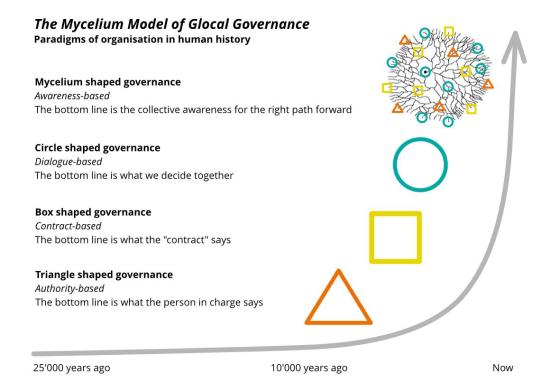July 19-23 2023
Description:
The need for a new shape for current and future challenges
As we recognise the need to see global challenges as a requirement for more global coordination and cooperation, and hence, the need for governance to become one global organisation, we at the same time see organisations of all sizes shifting from simple decision making structures towards a more complex governance culture. Governance at any level and organisations of any size are becoming increasingly synonymous concepts.
Different shapes of organising, providing a historic context
In recent human history, different paradigm shifts in how we organise and govern have come about at an increasing pace. From a triangle shaped governance, that is authority based and where the bottom line is what the person in charge is saying, to boxed shaped forms of organisation where the bottom line is what the "contract" says, to circle shaped governance, which is dialogue based and where the bottom line is what we decide together.
These waves of new forms of organising have spilled into the cultures of our society in ways where the older organisation structures continued to exist in parallel. The new organisations tend to form along side old ones, but grow to increasing importance, while the older organisation structures slowly fade in their relevance.
On the historic time scale, authority based organising has shaped our governance for thousands of years while contract based governance has become of primary importance during the past centuries. In comparison, dialogue based, collective decision making has really been gaining only during the past decades, with a vast amount of our governance structures still dominated by the earlier forms of organisation. However, we see an exponentially fast transformation happening towards the more advanced forms of organising, to the point of new paradigm shifts happening already before the impact of earlier shifts is fully felt in society.

The shape of the mycelium
We propose that the new shape of a governance culture to meet current and future challenges is that of the mycelium.
"I have increasingly come to regard the mycelium as a heterogenous army of hyphal troops, variously equipped for different roles and in varying degrees of communication with one another. Without a commander, other than the dictates of their environmental circumstances, these troops organise themselves into a beautifully open-ended or indeterminate dynamic structure that can continually respond to changing demands."
Dr Alan Rayner ( Biologist and Educator)
The word “mycelium” literally means “more than one”. The plural form is Mycelia. The word has modern Latin and Greek origins and was first coined in text in the early 1800’s, and refers to the thread-like body of a fungus.
The spores of most fungi grow a network of branching filamentous hyphae, which spread into the existing organic structures. In most fungi, hyphae are collectively called a mycelium. The hyphae excrete enzymes that break down the old and turn it into compost, which serves as nutrient for the emerging new.
Where hyphae gather to form a whitish mycelium-soil aggregated zone, called the shiro, a mushroom will come out as the fruit bodies of the mycelium, with its spores spreading to grow new hyphea elsewhere.
The shape of the Mycelium applied to governance
Like a spore from a mushroom, people that carry the awareness about a collective consensus in society, will be motivated to move to action along that path. Like hyphea, they will grow to find others that they can join in order to implement projects for manifesting the change that is called for. Or they will be motivated to further explore related aspects regarding that challenge and gather in groups with others that share that interest. Like in shiro, these gatherings, with the use of best practice processes, will create consensus outcomes statements that, like mushrooms, send the spores of that newly gained awareness out in society.
... Comment
... Link
... Comment
Last modified: 7/3/23 10:51 AM
| December 2025 | ||||||
|---|---|---|---|---|---|---|
| Sun | Mon | Tue | Wed | Thu | Fri | Sat |
| 1 | 2 | 3 | 4 | 5 | 6 | |
| 7 | 8 | 9 | 10 | 11 | 12 | 13 |
| 14 | 15 | 16 | 17 | 18 | 19 | 20 |
| 21 | 22 | 23 | 24 | 25 | 26 | 27 |
| 28 | 29 | 30 | 31 | |||
| July | ||||||